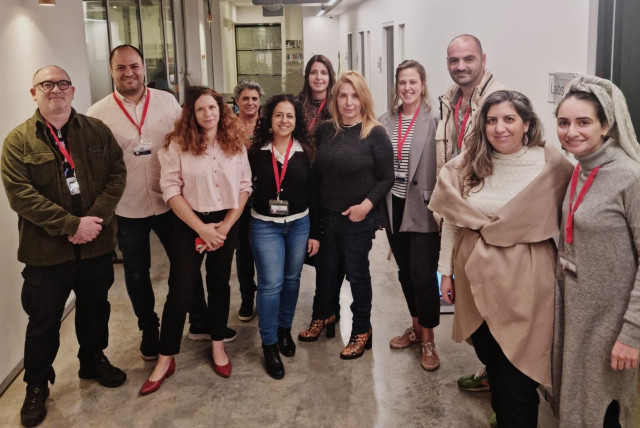Jerusalem students collaborate in hackathon, boosting Israel's digital PR during wartime

The group joined forces for a 48-hour hackathon with the goal of enhancing Israel's public relations efforts across various digital platform during the ongoing war.
Last week, Margalit Start-Up City in Jerusalem played host to a collaborative effort between 15 Jerusalem College of Technology (JCT) students and approximately 100 seasoned professionals, including programmers, product managers, project managers, and experts in marketing and social media. This diverse group joined forces for a 48-hour hackathon with the common goal of enhancing Israel’s public relations efforts across various digital platforms during the ongoing Swords of Iron war.
The event, which saw collaboration not only among academic institutions but also with members of the high-tech community, venture capital funds, companies, and entrepreneurs, aimed to address the challenges Israel faces in effectively conveying its messaging during the current conflict.
What happened during the hackathon?
During the hackathon, 15 teams explored numerous challenges, including combating disinformation, countering anti-Israel messages on social media, and creating tools to monitor and analyze trends related to anti-Israel content online.
“The fight for winning global public opinion has turned this entire country into activists,” said Yonatan Segir, a strategy and innovation consultant at the hackathon. “Advocating for Israel is a full-time job that requires broad knowledge, excellent communication skills and charisma. But their voices aren’t heard enough, and this is where this community can come in. This community can mobilize to combat the growing tide of anti-Israel and antisemitic sentiment we’re seeing online. We’re all in this together — government, academia, and citizens.”
One notable project involved a group of JCT and Hebrew University students developing a method to automatically identify and remove copyrighted posts on social media. The focus was on eliminating content that defames Israel or misleads the public by using outdated images, ultimately violating copyright rules.
Another team, composed of JCT students and a high-tech executive, created a search engine to identify trends on social media, helping Israel assess the impact of its messaging during the war. Meanwhile, a separate group worked on a Google Chrome extension to remove hostile posts and promote positive content, allowing users to report or support posts based on their stance toward Israel.
The hackathon also addressed the challenge of pro-Israel content removal on TikTok, with a team using AI to check compliance with TikTok rules and report violations.
The event concluded at the Foreign Affairs Ministry, where each group presented its projects. The ministry expressed its commitment to facilitating and implementing these innovative solutions to strengthen Israel’s global digital strategy.
“The Jerusalem high-tech community is unique, mainly due to the diversity of its population. Its residents have a broad spectrum of worldviews and talents, which enable each of them to come up with different ways to address challenges,” said David Saranga, head of digital communications at the Foreign Affairs Ministry.
“We’re very impressed with the solutions we saw, and we thank everyone who participated. Ultimately, these solutions should be incorporated into our global digital strategy either through the ministry itself or another independent body,” he said. “These solutions have the potential to help explain the legitimacy of Israel’s actions around the world and to help it achieve its security goals.”
Jerusalem Post Store
`; document.getElementById("linkPremium").innerHTML = cont; var divWithLink = document.getElementById("premium-link"); if (divWithLink !== null && divWithLink !== 'undefined') { divWithLink.style.border = "solid 1px #cb0f3e"; divWithLink.style.textAlign = "center"; divWithLink.style.marginBottom = "15px"; divWithLink.style.marginTop = "15px"; divWithLink.style.width = "100%"; divWithLink.style.backgroundColor = "#122952"; divWithLink.style.color = "#ffffff"; divWithLink.style.lineHeight = "1.5"; } } (function (v, i) { });


